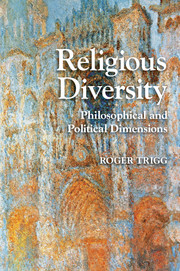Book contents
- Frontmatter
- Dedication
- Contents
- Introduction
- 1 The Challenge of Religious Diversity
- 2 Do Religions Claim Truth?
- 3 Religious Pluralism
- 4 The Roots of Religious Belief
- 5 Does Disagreement Undermine Theism?
- 6 Education and Religious Diversity
- 7 Truth and Coercion
- 8 Religious Diversity and Identity
- 9 Religion as Personal Preference
- 10 Freedom and Religion
- Bibliography
- Index
- References
4 - The Roots of Religious Belief
Published online by Cambridge University Press: 05 June 2014
- Frontmatter
- Dedication
- Contents
- Introduction
- 1 The Challenge of Religious Diversity
- 2 Do Religions Claim Truth?
- 3 Religious Pluralism
- 4 The Roots of Religious Belief
- 5 Does Disagreement Undermine Theism?
- 6 Education and Religious Diversity
- 7 Truth and Coercion
- 8 Religious Diversity and Identity
- 9 Religion as Personal Preference
- 10 Freedom and Religion
- Bibliography
- Index
- References
Summary
CAN GOD BE KNOWN?
God, or Ultimate Reality, may be beyond our full comprehension, but such a reality, if it exists, cannot be completely hidden from us unless it is to be ignored. The tradition in Christian theology of the so-called via negativa sees God as so wholly “other” that we are aware more of what we cannot say about such a reality than what we can. We know, for instance, that God is no more male than female. That does not mean “He” is a mixture of both, but rather that our human concepts break down when applied to “Him.” To refer God as “it” is just as misleading, if, as Christianity wants to affirm, “He” is personal, and humans can enter into a relationship with “Him.” They can refer to Him as “Our Father,” but realize that in any human sense He is not our father at all. Language breaks down at this point, but is the alternative (as some have argued) total silence?
The further Hick pushed the idea of “The Real” away from its grounding in any particular religion, the easier it was for it to lose all meaning, or to convey a misleading one. A nothing would serve as well as a something about which nothing could be said. Any realist understanding, we must stress again, has to accept that objective reality may exist in its own right and be independent of all human knowledge. Yet God's existence is not just a matter of fact, however interesting, about the furniture of the universe. God, if He exists and has created us, must, it is supposed by different religions, be related to us in some way. His is not the reality posited by deists who, particularly in the eighteenth century, saw God as the Being who had wound up the clockwork of the universe and then lost all interest in its development; who proclaimed the laws of nature and then immediately retired. A God of love could never be like that, but must be in some kind of relationship with those who, it is alleged, were created in His image.
- Type
- Chapter
- Information
- Religious DiversityPhilosophical and Political Dimensions, pp. 60 - 76Publisher: Cambridge University PressPrint publication year: 2014

